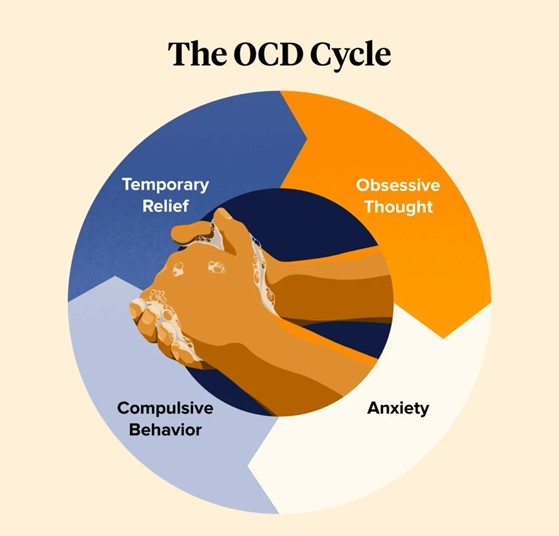The nurse is collecting data from a client with obsessive-compulsive disorder (OCD). Which of the following findings should the nurse expect? (Select all that apply.)
Irrational fear of certain objects
Difficulty relaxing
Unaware of compulsions
Rule-conscious behavior
Perfectionist behavior
Correct Answer : B,D,E
The client with OCD may experience difficulty relaxing and often feels tense, anxious, and irritable. They may engage in rule-conscious behavior and exhibit perfectionist tendencies, as well as experience compulsive behaviors. These behaviors may be time-consuming and interfere with daily activities.

Option A is incorrect because irrational fear of certain objects is more indicative of a phobia than OCD.
Option C is incorrect because clients with OCD are usually aware of their compulsions and may even try to resist them.
Reasons why the other options are not correct answers:
Option A: Irrational fear of certain objects is more indicative of a phobia than OCD.
Option C: Clients with OCD are usually aware of their compulsions and may even try to resist them.
Nursing Test Bank
Naxlex Comprehensive Predictor Exams
Related Questions
Correct Answer is C
Explanation
The parents report that the child injured herself by falling off the couch.
A spiral fracture is a type of broken bone that occurs when a twisting force is applied to the bone. It is often seen in cases of child abuse, where the abuser grabs and twists the child's arm or leg.
Choice A is not correct because bringing the child to the facility soon after the injury does not rule out abuse. The abuser may have done so to avoid suspicion or to prevent further complications.
Choice B is not correct because crying when the arm is examined is a normal reaction for a child who is in pain and scared. It does not indicate abuse or neglect.
Choice C is correct because it is unlikely that a fall from a couch would cause a spiral fracture of the ulna and radius. These bones are strong and require a lot of force to break. A fall from a couch would more likely cause a greenstick fracture, which is a partial break of the bone that occurs in children with flexible bones.
Choice D is not correct because a single injury does not exclude abuse. The child may have been abused before and healed without medical attention, or the abuser may have targeted only one part of the body. A single injury should still raise suspicion and prompt further investigation.
Correct Answer is C
Explanation
The client's behavior of stating "I'm fine" despite having traumatic injuries is an example of denial, a coping mechanism that involves denying that a problem or issue exists. Projection involves attributing one's own feelings to another person, displacement involves redirecting one's emotions onto a less threatening target, and undoing involves seeking to undo or forget past actions.
Choice A, projection, would involve the client attributing their own feelings to others.
Choice B, displacement, would involve the client redirecting their emotions onto someone or something else. Finally,
choice D, undoing, would involve the client attempting to forget or undo past actions.
Whether you are a student looking to ace your exams or a practicing nurse seeking to enhance your expertise , our nursing education contents will empower you with the confidence and competence to make a difference in the lives of patients and become a respected leader in the healthcare field.
Visit Naxlex, invest in your future and unlock endless possibilities with our unparalleled nursing education contents today
Report Wrong Answer on the Current Question
Do you disagree with the answer? If yes, what is your expected answer? Explain.
Kindly be descriptive with the issue you are facing.
